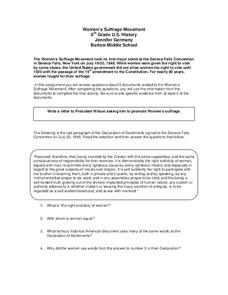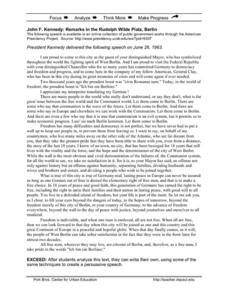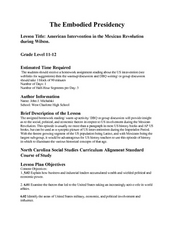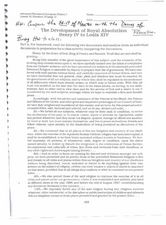College Board
Civic Knowledge and Action in AP U.S. Government and Politics
Vote, it's your civic duty! The high school lesson focuses on voter turnout and civic participation with a series of activities. Young scholars analyze data to discover voter turnout trends, complete worksheets, and participate in group...
Project Tahoe
Individual Rights vs. The Greater Good Within the Scope of War
When, if ever, is the government justified in restricting individual rights? When, if ever, should the "greater good" trump individual rights? To prepare to discuss this hot-button topic, class members examine primary source documents,...
Oakwood Publishing
Workshop 4: Constitutional Convention
How do new amendments become part of the US Constitution? AP government students explore, analyze, and use the US Constitution to develop a deep understanding of the interworkings of law and government while practicing synthesis and...
College Board
Balance of Power Between Congress and the President
Three branches of government help create a system of checks and balances. A helpful resource provides a series of articles regarding the balance of power between the legislative and executive branches of government. Historians answer...
Constitution Facts
U.S. Constitution Crossword Puzzles: Expert #1
Who became US Chief Justice in 1801? Which delegate from New York advocated a strict constructionist interpretation of the US Constitution? What is the term given to the chief or one of several import crops regularly grown and sold in a...
Curated OER
The Two Sides of the Declaration of Independence
Budding historians read six documents related to grievances that led to the writing of the Declaration of Independence. They then craft an essay in which they discuss the perspective of both the colonists and the king. This DBQ could be...
National Endowment for the Humanities
Lesson 1: The United States Confronts Great Britain, 1793–1796
After the Revolutionary War, the success of the United States was far from guaranteed. Foreign powers coveted the new land, and Great Britain challenged American sovereignty. Learners consider the challenges facing the new nation using...
Polk Country Schools
The Death of Abraham Lincoln DBQ
The assassination of Abraham Lincoln was a pivotal moment in American history, but what were the immediate effects throughout the newly unified country? A document-based question focuses on the consequences of the first assassination of...
Curated OER
Women’s Suffrage Movement
Though the movement for Women's Suffrage stretched over several decades and across two centuries, the final few years were the most difficult hurdle in many ways. Use a document-based question writing exercise to make inferences about...
Polk County Public Schools
The Blame Game for the Loss at Pearl Harbor
Known as the day that will live in infamy, the attack on Pearl Harbor in 1941 was a shock to all. But why was the United States unprepared on that December morning? Study a series of primary sources in a document-based question that...
Utah Education Network (UEN)
Boxing and Analysis
Model for your high schoolers how to prepare for the essay portion of the AP Literature exam. For guided practice, pairs analyze metaphor, simile, tone or syntax in Norman Mailer’s “The Death of Benny Paret,” and then work independently...
Polk Bros Foundation
John F. Kennedy: Remarks in the Rudolph Wilde Platz, Berlin
“Ich bin ein Berliner.” Here’s the full text of John F. Kennedy’s famous address delivered to the people of Berlin on June 26, 1963. The resource could be used as part of a study of Kennedy’s presidency, of rhetorical devices, or as...
Curated OER
Imposing Democracy
Twelfth graders discuss the probability of imposing a democracy in a country in which there is no history of this type of government being successful. Using the internet, they work together to research Japan's experience with democracy...
Curated OER
Demonstrating an Understanding the Evolution of Democracy in the United States
High schoolers explore how democracy in the United States changed and evolved from its birth to the present. They participate in a mock testing environment. Students write a multi-tasked essay on American government and politics.
Curated OER
Art of Cynicism
High schoolers analyze selected pieces of art and infer how they reflect a sense of disillusionment, and/or cynicism in American society in the aftermath of the Vietnam War and Watergate scandal. Then they identify and place cultural...
Curated OER
Constitution Cartoons
Students view series of cartoon overheads that explain Constitution, name branches of government and their powers, define federalism and separation of powers, examine rights and obligations of citizens, and discuss significance of...
What So Proudly We Hail
Life, Liberty, and the Pursuit of Happiness: A Lesson on the Declaration of Independence
What does it mean to say that a right is unalienable? How did the founding fathers convey this revolutionary concept in the Declaration of Independence? Engage in a close reading and analysis of the Declaration of Independence, and...
Curated OER
The Embodied Presidency Wilson
Students take a closer look at U.S. intervention in Mexico. In this 20th century history lesson, students examine primary documents to consider why the United States entered the Mexican War and then write DBQ essays on the topic.
Curated OER
The Development of Royal Absolutism
In this Absolutism worksheet, students read a 3-page article titled "The Development of Royal Absolutism," and then compare the Edict of Nantes to the Decree of Revocation.
Curated OER
What is Public Use?
Explore the Fifth Amendment by examining the meaning of "public use" as learners read a scenario and role play their assigned parts to determine "public use." They also read Supreme Court Cases regarding the amendment and present their...
Curated OER
Social Studies: U.S. and China Trade Relations
Twelfth graders assess the status of trade relations between the United States and China. In groups, they give short presentations defending or opposing trade relations with China. After a class vote on the issue, 12th graders write...
Khan Academy
Khan Academy: Ap Us Government and Politics
A landing page for the AP US Government and Politics course. Most of the lessons seem to match those in US Government and Civics course, but not all.
Khan Academy
Khan Academy: Ap Us History: Period 6: 1865 1898: Government Role: Guilded Age
This practice exercise from Khan Academy covers Period 6: 1865-1898 in American History. The controversies over the role of government in the Gilded Age is reviewed in this resource. This resource is designed as a review for the AP US...
Khan Academy
Khan Academy: Ap Us History: Period 6: 1865 1898: Laissez Faire: Gilded Age
The study resource from Khan Academy provides an overview of Period 6: 1865-1898 in American History. Laissez-faire during the Gilded Age is discussed in this lesson. This resource is designed as a review for the AP US History Test.
Other popular searches
- Ap Us Government Media
- Ap Us Government 1812
- Ap Us Government Labels
- Ap Us Government Idealogy
- Ap Us Government Spectrum

























